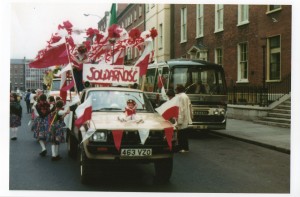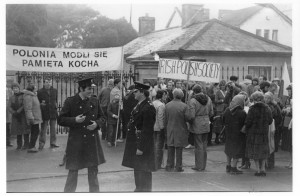Poland was a country in crisis in the early 1980s. The founding of the free trade union, Solidarity, in the Gdansk shipyard in August 1980, led to resistance to the Communist government. On 13th December, 1981, General Jaruzelski declared martial law and the army took control of the country.
In Ireland a group of Polish people and Irish supporters organized protests and fund-raising events and sent a large amount of aid to Poland. An exhibition in Blanchardstown Public Library, Blanchardstown Centre, from March 1st-13th and a public meeting on March 8th at 7.00pm commemorates this episode in Irish-Polish relations.
The Irish Polish Society was formed in 1979 for the visit of Pope John Paul 2. At that time the number of Poles in Ireland was about 350. Among them was Dr. Janina Lyons of Coolmine whose husband, Sean Lyons, an independent councillor on Dublin County Council, was PRO for the group.
During martial law in Poland thousands of activists were rounded up and interned. People had to get permission to travel from one city to another. The Polish people suffered shortages and many shops were empty. From late 1981 the Irish Polish Society organized concerts, made collections and took part in pickets and vigils. Polish artist, Ula Retzlaff–O’Carroll made a special Christmas crib with puppets of Jaruzelski consulting with the Devil.
Jan Kaminski of the Irish Polish Society challenged RTE “to reveal the true conditions of Poland where thousands are held in detention camps, recreation facilities are closed, food shops crowded with scanty supplies at inflated prices.”
Among the events was an All-Priests Show in the Olympia Theatre, a Charity Night in Dolly Heffernans and a special performance of The Pirates of Penzance, all in aid of the Polish Relief Fund.
During 14 months the Irish Polish Society sent 20 containers of medicines, powdered milk, baby food and clothes to Poland, valued at more than £250,000. Carriers took the cargo free of charge. The containers left Dublin Port by ship to the Polish port of Szczecin for distribution.
Martial law was eased in February, 1983, with the release of Lech Walesa, but the position of many Poles was still grim. Food, clothing, shoes, soap and medicines were in short supply while meat, detergents, cotton wool and children’s exercise books were rationed. In February, 1984, the IPS appealed for items for an Auction for Aid to Poland.
Over the years the Irish Polish Society has worked in many ways to improve understanding between Ireland and Poland, but the period of martial law was a highpoint. There are times when individuals can have an impact on history when leaders and governments fail. These occasions are rare, but are important and they should be remembered.
Patrick Quigley
Irish Solidarity with Poland, Blanchardstown Public Library Exhibition.
March 1st-13th
Public Meeting in Blanchardstown Library, Monday, March 8th @ 7.00pm with local activists, a short film and some stirring protest music from folk-singer, Justyna Kosmulska. Adm: free.


